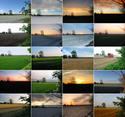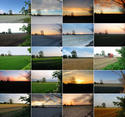So far, 2009 has not been a banner year for greens in Los Angeles. As the area's mainstream enviros buddy up with self-described green politicians and deep-pocketed land speculators and unions who have seemingly joined the “sustainability” cause, an odd thing is happening: Environmentalists are turning into servants for more powerful, politically-connected masters. read more »
Transportation
Enviro-wimps: L.A.'s Big Green Groups Get Comfy, Leaving the Street Fighting to the Little Guys
Why Rapid Transit Needs To Get Personal
Innovation in urban transportation is the only long-term correction for expensive environmental losses and energy waste. Why, then, isn’t there a US plan for more vigorous exploration and demonstration of new systems using advanced technologies, particularly automation? Where is the Personal Rapid Transit — PRT — in US transportation policy? read more »
Telecommuting And The Broadband Superhighway
The internet has become part of our nation’s mass transit system: It is a vehicle many people can use, all at once, to get to work, medical appointments, schools, libraries and elsewhere.
Telecommuting is one means of travel the country can no longer afford to sideline. The nation’s next transportation funding legislation must promote the telecommuting option...aggressively. read more »
Letter From Asia's Co-Prosperity Sphere
To visit banks in Hong Kong and Kuala Lumpur, I recently flew into Shanghai and out from Singapore. In two weeks, I rode a lot of trains and met a lot of bankers. When I got home to Europe, it felt like I had traversed a Greater Economic Co-Prosperity Sphere, although I was never sure if it was one that belonged to China, Japan, or the international banking system. Here's a highly personal, thumbnail report on the region's development and some of the local rail network: read more »
- Login to post comments
America’s Energy Future: The Changing Landscape of America
During the first ten days of October 2008, the Dow Jones dropped 2,399.47 points, losing 22.11% of its value and trillions of investor equity. The Federal Government pushed a $700 billion bail-out through Congress to rescue the beleaguered financial institutions. The collapse of the financial system in the fall of 2008 was likened to an earthquake. In reality, what happened was more like a shift of tectonic plates. read more »
- Login to post comments
How Can Cities with Unaffordable Housing be Ranked Among the Most Livable Cities in the World?
The Economist magazine's "Economic Intelligence Unit" (EIU) has published its most recent survey of the most livable cities in the world.
Vancouver, Canada, ranks number one, Vienna, Austria number two, Perth, Australia number five, Geneva number 8, Zurich, number 9, (both in Switzerland) and Auckland, New Zealand, number twelve. read more »
Federal Highway Trust Fund: Problem Solving, Government Style
News Flash: The Federal Highway Trust Fund will go broke in August.
It went broke last year, and Congress needed an emergency transfer of $8 billion to keep it solvent. There was very little concern last year, but this year we find ourselves in a post-modernist political environment where managing a crisis is good politics, although actually all we do is talk about it. read more »
Painting the Town White: Technology and Greenhouse Gas Emissions
“Paint the world white to fight global warming” was the astonishing headline from The Times of London. The paper was referring to a presentation made by United States Secretary of Energy, Dr. Stephen Chu at the St. James Palace Nobel Laureate Symposium last week. Chu was reported as saying that that this approach could have a vast impact. read more »
- Login to post comments
San Jose, California: Bustling Metropolis or Bedroom Community?
Dionne Warwick posed the question more than 40 years ago, yet most Americans still don’t know ‘The way to San Jose’. Possessing neither the international cachet of San Francisco nor the notoriety of Oakland, San Jose continues to fly under the national radar in comparison to its Bay Area compatriots. Even with its self-proclaimed status as the ‘Heart of Silicon Valley’, many would be hard pressed to locate San Jose on a map of California. read more »
The Changing Landscape of America: The Fate of Detroit
INTRODUCTION
During the first ten days of October 2008, the Dow Jones dropped 2399.47 points, losing 22.11% of its value and trillions of investor equity. The Federal Government pushed a $700 billion bail-out through Congress to rescue the beleaguered financial institutions. The collapse of the financial system in the fall of 2008 was likened to an earthquake. In reality, what happened was more like a shift of tectonic plates.
In 1912 a German scientist, Alfred Wegener, proposed that the continents were once joined together as one giant land mass called Pangea. read more »






















